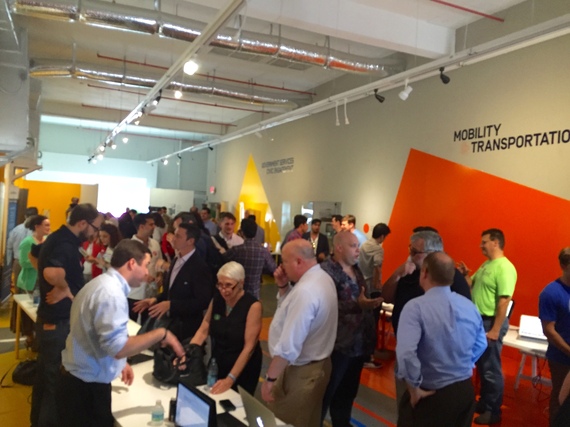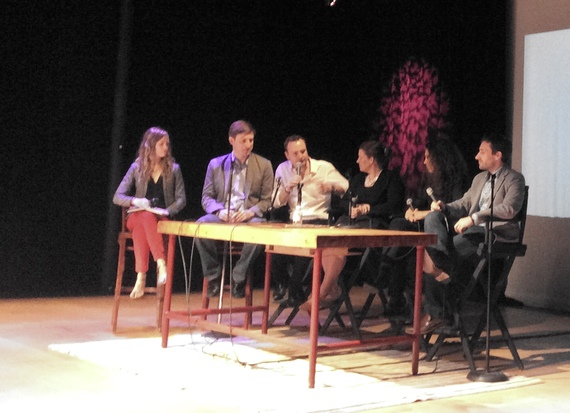I spent the past few days with our COO at the Smart City Startups Festival in Miami, Florida, interacting with some of today's most visionary, innovative urban tech startup founders who are disrupting almost every facet of the urban landscape. All of the startups showcased at the summit have the potential of changing the future of our cities. Some are implementing solutions which are quite ingenious in their simplicity, like Loveland Technologies, which makes ownership of land parcels transparent (and raised funds through creative sales of inches of Detroit land parcels through "inchvestors", and Vizalytics, which filters through the cacophony of data to help small businesses quickly understand what policies, work orders, or inspections will directly affect their business. Other showcased teams are immersed in big ideas like those of, BRCK, whose rugged tech is bringing internet access to remote regions of the globe. It was an incredible honor to have the opportunity to demonstrate how our own company, APPCityLife, is helping deliver powerful mobile apps in cities which can change the way people interact with their city, from being able to get to a job on time by using a real-time tracking app for transit to finding out about distributions of fresh fruits and vegetables at a local food bank.
But the invention of cool urban tech doesn't mean it's going to be available to you, the citizen, any time soon. One of the biggest barriers to getting this tech into the real world remains the challenge of navigating archaic government procurement policies. If you think waiting in the customer service line of a Department of Motor Vehicles is a practice in frustration, try pushing a single contract through almost any city government. But there is good news. Because the clamor for better tech is now coming from within and without government agencies, some civic leaders, organizations and entrepreneurs are exploring alternative paths to engage with urban tech startups.
Nonprofits like the Knight Foundation, the Ewing Marion Kauffman Foundation, Living Cities, Bloomberg Philanthropies, New Cities Foundation as well as many others funding programs aimed at disrupting solutions for select issues such as education, entrepreneurship and economic development. In addition, organizations like Code for America have also helped to disrupt through advocacy, by forming brigades of volunteers within communities to address local issues, and by deploying carefully selected fellows into select cities each year to address a particular need. Other organizations, like Citymart, are focused on disrupting the procurement process itself. With several successes under their belt within the European community, the Barcelona-based company has opened an office in New York City's Civic Hall and signed on several initial cities to participate in a series of challenges which invite innovative urban tech startups to submit solutions with the chance to move forward with a larger contract should an initial pilot prove successful.
And then there are the city administrators who are choosing to disrupt the way they work with urban tech startups. One nugget of advice often shared by government administrators is for startups to work for free. I have to admit that the advice that startup founders should work for cities for free can be a bit disconcerting, if only because it is almost always given by someone who not only stands to benefit from free tech but is certainly not working for their own government agency for free. While this model does have its benefits, there are also drawbacks that must be taken into account. When a startup is delivering a service for free, they are far more likely to run out of cash and leave a government agency adrift with a non-working technology - and no one to hold accountable. Additionally, entering the market with a free model may help startups determine the willingness to use a technology, but that is not the same a willingness to pay for that same technology. When founders give away services to any customer, government or otherwise, it is very difficult to begin charging at some later date. We've seen this free-first model pay off in very big ways, but it takes setting up clear boundaries ahead of time as to what parts of service will be free, how long the free model will last, what next steps will be possible if initial free phase is a success, etc. When a free-first model can prove a startup's ability to deliver and the city's ability to save money or deliver services better, it can be an excellent opportunity to get a foot in the door and disrupt the status-quo. But when it is not set up with clear expectations and end dates, it can eat a startup's budget with nothing to show for it.
Here are a few additional ways we've found to be successful in disrupting current procurement policies to get new urban tech into the hands of the people who need it. When startups devise business models which generate revenue from sources outside of government, it becomes a win-win for everyone around. In addition, proving future savings to a government agency can be a good way for urban tech founders to gain early customers. If new tech will streamline processes, improve efficiencies, or encourage citizens to embrace more affordable options - and if the startup can track the data needed to prove those cost savings, every sale after the initial pilot will be easier. And lastly, when founders take the time to understand the problems a city department is facing - what their biggest headache is within a specific task or as an agency - and when a startup can show that their tech will solve that problem, founders can gain the buy-in and willingness from the government to find money or babysit a contract through procurement processes to gain access to that pain-reliving solution.
Of course, the bigger issue is the procurement policies themselves. Most have not kept up with emerging civic tech. But we cannot afford to wait for politicians and legislators hash out the nuance of new policies. Working at the slow pace of policy change is not an acceptable solution for anyone. Until better procedures manage to gain enough votes to become law, those of us within the urban tech community must continue to disrupt not only the way cities interact with the people who live there but the way cities work with urban tech startups. As a society, we cannot wait for legislators to get up to speed and pass laws that make sense for this new world of smart cities - there is too much at stake. When we have the power to lift entire communities out of poverty by delivering better city services like reliable transit or helping deliver needed supports like food-finding apps to food banks, there is a moral imperative to find new ways to foster urban tech startups and deliver the successful solutions throughout the world.



